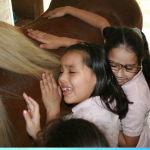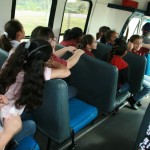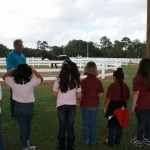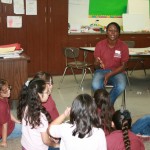
Sixteen second-grade girls rode the school bus with the windows open, pigtails and ponytails whipping in the wind. For many, it was their first trip outside the city.
“It smells like grass,’’ said one girl. “It smells like McDonald’s,’’ said another.
“No,’’ said teacher Matilda Bediako-Ortiz, holding her nose, “it smells like something else.”
The girls were on a journey to see horses, part of the curriculum offered at their single-gender charter school, Just For Girls Academy in Bradenton, Fla.
The horses help teach compassion, consideration, courage – all part of the school’s emphasis on character development.
Many of the girls come from single-parent families, where moms juggle jobs and classes. Some were bullied at their old school, so they feel safer at the academy with only 89 students. Others just seem to learn better without boys.
“We have a culture of caring here,’’ said Principal Jennifer Rosenboom.

The ability to cater to a particular learning style or need is what’s fueling the growth of charter schools in Florida and beyond. Across the country, there are now more than 6,000 charter schools, including 529 that opened in August. In Florida, more than 200,000 students are enrolled in 574 charter schools across 44 school districts.
The schools are funded with public tax dollars based on enrollment, like traditional public schools, and sometimes supplemented with private donations. They have their own school boards. They can hire and fire teachers. They set their own hours.
But what really makes the schools attractive for many parents and students is the freedom to design unique curriculum and programs, says Eric Paisner, the vice president of knowledge and partnerships at the National Alliance for Public Charter Schools.
“Parents are demanding more high-quality public options,’’ Paisner said. “And parents are latching on, particularly parents that wouldn’t have had choices otherwise.’’
Florida’s charter schools offer a smorgasbord of diversity. The Pemayetv Emahakv Charter School, on the Seminole Indian Tribe’s Brighton Reservation, offers language programs in Creek, the Seminoles’ native tongue. The Orlando Science School, affiliated with the University of Central Florida, offers themes in STEM – science, technology, engineering and math. The prestigious Miami Arts Charter School, in Miami’s trendy design district, was founded by musicians.
Paisner said he hasn’t heard of a charter school that uses horses in its curriculum, but he knows of many, especially in rural parts of the country, that incorporate planting crops or other outdoor activities into lesson plans.
Just For Girls Academy opened in August with kindergarten through third grade. Plans call for adding a grade every year until it becomes K-8. The school’s priority is helping girls succeed in reading, math, science and technology.

Rosenboom, a 28-year veteran of Manatee County’s public school district, is also the owner of five horses. The former education consultant once traveled the country training teachers for inner-city schools.
She said she knows of no other single-gender elementary charter school in Florida. Yet the elementary level is the perfect time to teach girls life skills that can be carried through adulthood, she said.
Single-gender schools aren’t for every child. But ask the girls why they want to attend the single-gender academy, and it’s pretty simple.
“I wanted to go here,’’ said 8-year-old Laisa Nunez, her hair beads bouncing with each bump in the road. “There’s no boys around and they never do, like, crazy stuff,’’ she said of her female classmates.
Before the trip, the girls answered questions about how they see themselves in the world. Are they brave? Are they scared? Most said they are not afraid.
“That’s good,’’ Rosenboom said. The goal is to help them keep that image, something girls struggle with as they head toward middle and high school.
“We want to help them build their confidence, to bring some joy in their lives,’’ said Becky Canesse, chief executive officer of Just For Girls, the Manatee County girls club affiliated with the academy.
The hope is that the horses will help.
As the bus turned into the driveway at the Sarasota Manatee Association for Riding Therapy, a nonprofit that works with children with special needs, the girls caught sight of what they came to see.
“It’s a horse, it’s a horse!’’ they squealed.
One-by-one, they were led to a corral where they learned about respecting a horse’s personal space and gaining its trust. They listened as volunteers from the association explained how to read a horse’s body language.

“Can we touch them?’’ one girl asked. “Can we talk to them?’’ another wondered.
Melanie Cancio, 8, had never been so close to a horse. When her turn came to stroke the back of the horse named Jazz, her hand reached out timidly.
“I predicted it would feel like rubber,’’ Melanie told the other girls. “It feels like a pillow.’’
Soon, the girls were feeding the horses and brushing their silky manes. By the end of the visit, they were hugging the animals.
Back in the classroom, the students talked about what they learned – don’t run around the horses; don’t skip or jump or stand behind them; let them get to know you before you pet them – and how those lessons might relate to life at school.
Don’t scare each other or try to make each other angry, they said. Try to get to know each other. Respect each other’s differences.

Afterward, Bediako-Ortiz asked how many of the girls were proud of themselves.
Every hand went up.


